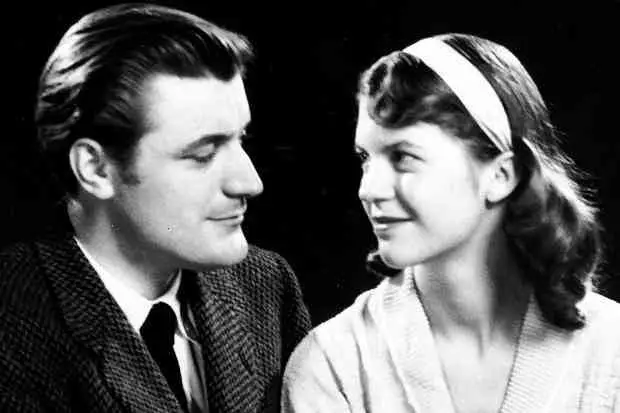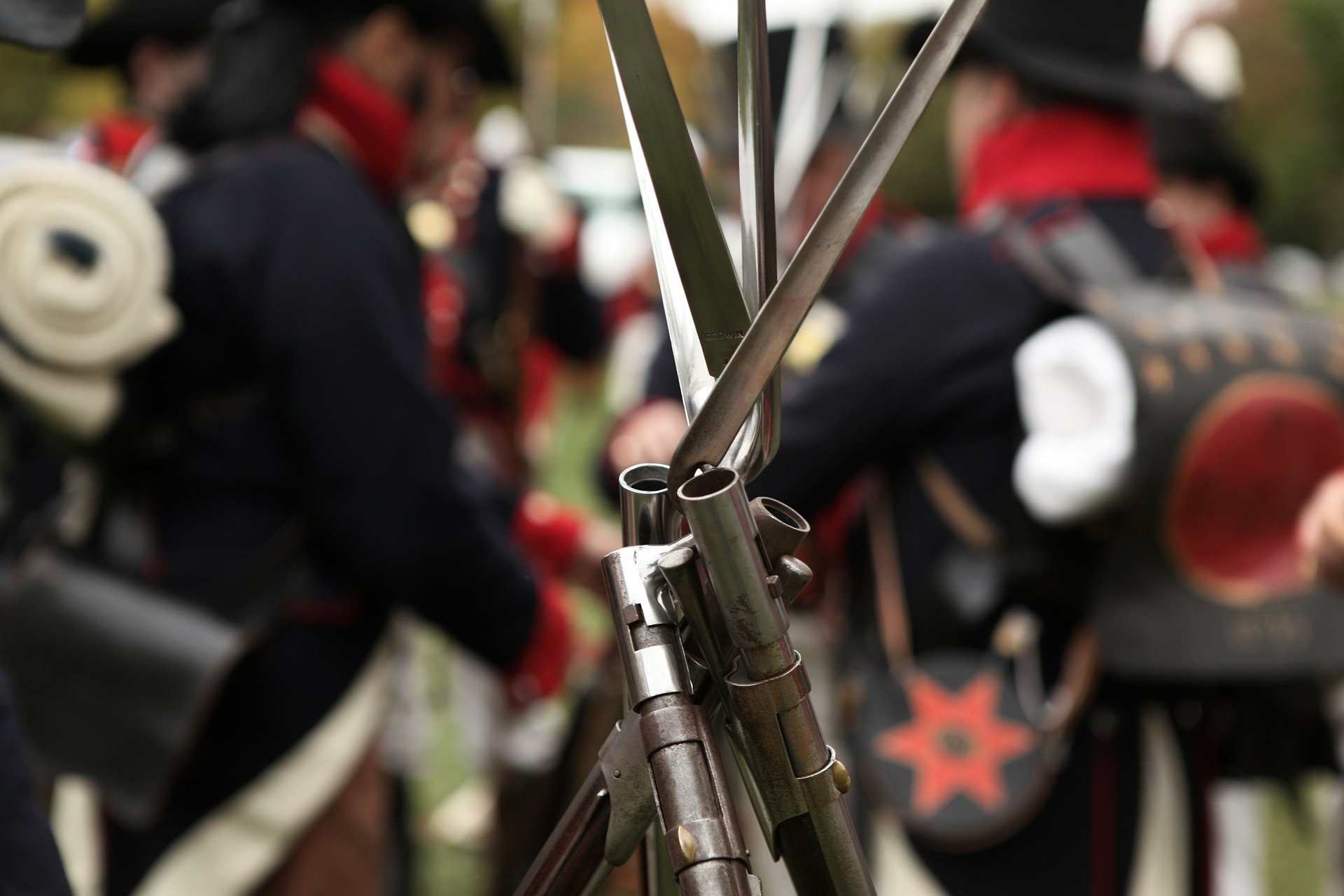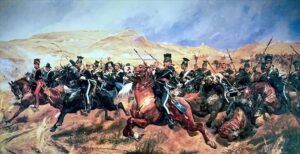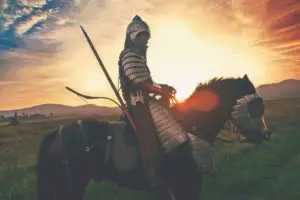
FULL POEM - SCROLL DOWN FOR LINE-BY-LINE ANALYSIS
Suddenly he awoke and was running – raw
In raw-seamed hot khaki, his sweat heavy,
Stumbling across a field of clods towards a green hedge
That dazzled with rifle fire, hearing
Bullets smacking the belly out of the air –
He lugged a rifle numb as a smashed arm;
The patriotic tear that had brimmed in his eye
Sweating like molten iron from the centre of his chest, –
In bewilderment then he almost stopped –
In what cold clockwork of the stars and the nations
Was he the hand pointing that second? He was running
Like a man who has jumped up in the dark and runs
Listening between his footfalls for the reason
Of his still running, and his foot hung like
Statuary in mid-stride. Then the shot-slashed furrows
Threw up a yellow hare that rolled like a flame
And crawled in a threshing circle, its mouth wide
Open silent, its eyes standing out.
He plunged past with his bayonet toward the green hedge,
King, honour, human dignity, etcetera
Dropped like luxuries in a yelling alarm
To get out of that blue crackling air
His terror’s touchy dynamite.

LINE-BY-LINE ANALYSIS
STANZA 1
Suddenly he awoke and was running – raw
In raw-seamed hot khaki, his sweat heavy,
The poem begins in media res as the soldier gains consciousness, plunging him and the reader into the action simultaneously. The instantaneity with which he goes from awakening to running creates a sense of urgency, although Hughes purposefully leaves the reader unaware of its source, evoking suspense. The word ‘raw’ is a homograph, and is repeated here in different senses – firstly to describe the soldier’s emotions, namely his fear and desperation, and secondly the lack of hem to his, therefore evidently carelessly-made, ‘hot khaki’ uniform.
Stumbling across a field of clods towards a green hedge
That dazzled with rifle fire, hearing
Bullets smacking the belly out of the air –
The image of ‘a field of clods’ (a lump of earth) describes the war-torn state of the battlefield, emphasising the brutal destructivity of war. The ‘green hedge’ that the soldier stumbles towards is a piece of seemingly untouched nature amongst a ruined landscape or, metaphorically, a symbol of hope amongst the surrounding devastation. The word ‘dazzled’ glamorises the ‘rifle fire’, juxtaposing the surrounding destruction as well as the metaphor, ‘bullets smacking the belly out of the air’ which personifies the bullets as being violent and terrifying (emphasised by the onomatopoeic ‘smacking’) in nature. This juxtaposition highlights the soldier’s disorientation.
He lugged a rifle numb as a smashed arm;
This simile describes how the soldier struggles under the weight of his rifle, ‘numb as a smashed arm’ with the effort. The term ‘smashed arm’ is a further symbol of pain and violence, again referencing the brutality of war.
The patriotic tear that had brimmed in his eye
Sweating like molten iron from the centre of his chest, –
These are two profound, complex lines, open to multiple interpretations. The tear could have brimmed in the soldier’s eye due to the physical pain he was in, perhaps from exertion or an injury that put him into the unconscious state that he awoke from at the start of the poem. Or it could have been due to the psychological toll of war. Hughes labelling the tear as ‘patriotic’ may symbolise how the soldier is driven by patriarchy or how it clouds his judgment, akin to how a tear clouds one’s vision. This tear is described as then ‘sweating like molten iron from the centre of his chest’, seemingly a metaphor for the soldier losing his patriarchal beliefs – a relief, albeit a painful one, just like molten iron leaving your body would be.
STANZA 2
In bewilderment then he almost stopped –
In this stanza, the soldier, no longer driven by patriarchy, questions his purpose and almost stops running. After the adrenaline rush that drove him to run across the battlefield in the previous stanza has subsided along with the destruction he witnessed, he awakes to the horror and futility of war. The caesura at the end of this line creates a pause in the poem’s rhythm, reflecting the physical pause in his running as well as the shift in his mindset.
In what cold clockwork of the stars and the nations
Was he the hand pointing that second? He was running
The war itself is part of, what Hughes dubs, the ‘cold clockwork of the stars and the nations’ which refers to the hostilities between countries (the alliterative c’s in ‘cold clockwork’ create a harsh, aggressive sound, emphasising this hostility), seemingly ever-present like the passage of time. Here the disorientated soldier questions to whom his allegiances lie or for whom he is the hand pointing, aware that he is simply a pawn in this bigger game of chess, but unsure for whom he is playing for.
Like a man who has jumped up in the dark and runs
Listening between his footfalls for the reason
Of his still running, and his foot hung like
Hughes describes the soldier ‘as listening between his footfalls for the reason’ behind his running. As well as reiterating his disorientation, this phrase portrays the soldier’s fear, as listening between his footfalls, as if listening out for a potential attacker (the pause he takes to do so reflected by the caesura following the word ‘running’) is a trademark of fear.
Statuary in mid-stride. Then the shot-slashed furrows
STANZA 3
Threw up a yellow hare that rolled like a flame
And crawled in a threshing circle, its mouth wide
Open silent, its eyes standing out.
The ‘shot-slashed furrows’ are trenches dug into the battlefield, the alliterative term ‘shot-slashed’ describing how the impact of the gunshots has deformed the surrounding earth. These ‘furrows’ are personified as throwing ‘up a yellow hare’, a metaphor for gunfire, with the simile ‘it rolled like a flame’ describing how the flashes of light from the firing rifles resemble a burning fire in the sky. The imagery of the hare crawling ‘in a threshing circle’ with ‘its mouth wide open’ is violent and describes how the hare is suffering, so intensely and with ‘its eyes standing out’ that it appears to be about to die from its injuries. Perhaps the hare dying is a metaphor for the soldiers that died on that very battlefield, or for the devastating impact that war has on the natural world.
He plunged past with his bayonet toward the green hedge,
King, honour, human dignity, etcetera
Dropped like luxuries in a yelling alarm
The plosive alliteration of ‘plunged past’ quickens the pace of the poem when spoken, reflecting the soldier’s desperation to reach the hedge he has been fixated on and now charges towards. The next two lines are significant, describing how his previous patriotic motivations fall by the wayside as his life hangs in the balance and his survival instinct takes over and overwhelms him. This is emphasised by how the word ‘etcetera’ undermines the triplet preceding it, confirming how ‘King, honour’ and ‘human dignity’ have become meaningless to the soldier, as he loses such beliefs ‘in a yelling alarm’, this signifying his fear and his, almost animalistic, desperation to survive.
To get out of that blue crackling air
His terror’s touchy dynamite.
The ‘blue crackling air’ is a metaphor for the gunfire in the air around him. The ‘crackling’ is onomatopoeic, an example of sensory language used to paint a vivid picture of the brutality of the battlefield. ‘His terror’s touchy dynamite’ is the fear that drives his desperation to escape this battlefield, the alliteration of ‘terror’s touchy’ reflecting his adrenaline-fuelled alertness. The word ‘dynamite’, an explosive, is a symbol of destruction and terror as well as reflecting the firing of guns and exploding shells around him. The poem ends on a cliffhanger, poignantly leaving the soldier’s, most likely doomed, fate to the imagination of the reader as he attempts to flee the battlefield with his life intact.


